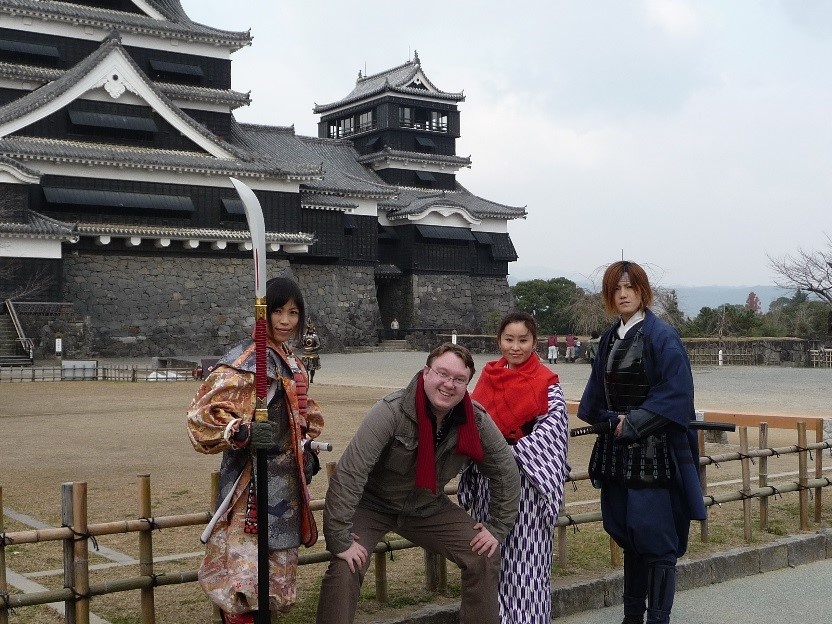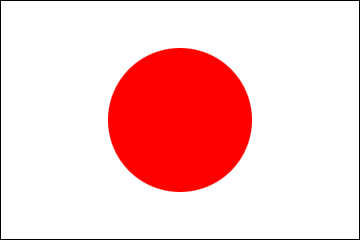Interview with Mr. Alex Salov
2017/3/31

Alexander "Alex" Salov is the Business Operations Manager of World Trade Center Alaska and has been working at the Center since 2004. He has a Master’s degree in Global Supply Chain Management from the University of Alaska Anchorage (UAA). Since 2005, he also teaches Japanese Language at UAA as an Adjunct Instructor.
Alex is an active member of Alaska's Japanese community and serves on boards of the following Japan-related organizations: Japan Alaska Association (Vice President), Alaska Association of Teachers of Japanese (Treasurer), and the Montgomery Dickson Center for Japanese Language & Culture (Advisory Board Member).
How did you begin learning Japanese?
My first encounter with the Japanese language was through my mother, an English professor, whose university had an exchange program with a college in the Niigata prefecture. When I was a kid, she introduced me to the English language, but, as I grew older, I started studying Japanese for my own personal enjoyment. My first encounter with the Japanese language was through children’s books that my mother brought from Japan in the late 1980s. I was particularly curious about one math book for children that I got. It had many cute pictures and I was trying to figure out what was written in it. At home we had a Japanese-Russian dictionary and I began to translate those books and writing down some Japanese words.
In 1992, I started learning Japanese through a TV course. At that time, there was a daily TV program in Russia called Konnichiwa Nihongo and a workbook for that show was on sale everywhere. Later, I took Japanese classes at the local Japan Center, where we studied using the Shin Nihongo no Kiso textbook (the predecessor of the Minna no Nihongo textbook that is being widely used nowadays). I also became involved in a Japanese club at my high school, where we sang a lot of Japanese songs. In addition, I had some Japanese pen pals with whom I could exchange letters in Japanese so I could practice my writing skills. Practice and repetition is key to learning a new language.
I first traveled to Japan in 1996 while performing with a Russian folk music orchestra. We toured the Aomori and Hokkaido prefectures playing Russian folk music and we also had some Japanese songs in our program. This was my first time traveling abroad. Since then, I have been to Japan about 15 times, and I would like to visit again this summer.
How did learning Japanese influence your decision to go into a business career?
Japanese government opened several Japan Centers across Russia in the early 1990s where Japanese instructors taught various business courses as well as Japanese language courses. The Japanese were considered experts in many business fields. In the 1990s, Japanese Ministry of Foreign Affairs published magazines for foreigners that were focused on introducing readers to Japanese business. Today, those magazines (Nipponia, for example) are more culture-oriented.
During the breakdown of the Soviet Union, a lot of international business opportunities opened up. Many foreign tourists traveled to the Russian Far East where I’m from. Japanese citizens, who lived there, spoke Russian, so I appreciated the value of being able to speak more than one language.
Did you ever plan on becoming a teacher? If not, how did you end up as an instructor at UAA?
No, I never had plans to go into teaching. I figured I would work in Russia using some of my language capabilities. I never expected to come to Alaska either, let alone to end up staying.
I came to Alaska in 2000 as a part of a partnership program between the Far Eastern State Transport University (FESTU) in my hometown of Khabarovsk and UAA. UAA and FESTU had a student exchange program for a long time, so I came to UAA to complete my bachelor’s degree in logistics.
At UAA I started looking into Japanese studies. I met with Dr. Hiroko Harada, she introduced me to the UAA Japanese program, and I eventually graduated with a second degree in Japanese at the same time I graduated with my logistics degree.
After that, I started working at the World Trade Center Alaska (WTCAK) and became an adjunct instructor of Japanese at UAA. At that time, in addition to my two jobs, I was also studying for an MS degree in Global Supply Chain Management. I am now the business operations manager for WTCAK and teach Japanese levels 100 and 200 at UAA.
How have your experiences influenced your methods of teaching Japanese to UAA students?
I like to teach students not only the Japanese language, but also about the life and culture of Japan. For example, I try doing calligraphy with them, so that they have a taste of it. I tell students about my personal experiences in Japan and give them various tips on what to do and what not to do there. Speaking three languages gives me an ability of being able to explain some grammatical points from a point of view that is different than the textbook. I also advise students not to translate every Japanese word into English – translation slows their reaction and negatively affects their conversational skills.
It’s interesting to learn why students choose to begin studying Japanese. When I survey my students asking them about their interest in Japanese, I get a variety of answers. Recently, I noticed a shift in students’ interests towards Japanese culture rather than business like when I was a student. Some enjoy Japanese music and anime, some have family connections in Japan or have lived in Japan, and some just want to know Japanese for travelling.
Alex is an active member of Alaska's Japanese community and serves on boards of the following Japan-related organizations: Japan Alaska Association (Vice President), Alaska Association of Teachers of Japanese (Treasurer), and the Montgomery Dickson Center for Japanese Language & Culture (Advisory Board Member).
How did you begin learning Japanese?
My first encounter with the Japanese language was through my mother, an English professor, whose university had an exchange program with a college in the Niigata prefecture. When I was a kid, she introduced me to the English language, but, as I grew older, I started studying Japanese for my own personal enjoyment. My first encounter with the Japanese language was through children’s books that my mother brought from Japan in the late 1980s. I was particularly curious about one math book for children that I got. It had many cute pictures and I was trying to figure out what was written in it. At home we had a Japanese-Russian dictionary and I began to translate those books and writing down some Japanese words.
In 1992, I started learning Japanese through a TV course. At that time, there was a daily TV program in Russia called Konnichiwa Nihongo and a workbook for that show was on sale everywhere. Later, I took Japanese classes at the local Japan Center, where we studied using the Shin Nihongo no Kiso textbook (the predecessor of the Minna no Nihongo textbook that is being widely used nowadays). I also became involved in a Japanese club at my high school, where we sang a lot of Japanese songs. In addition, I had some Japanese pen pals with whom I could exchange letters in Japanese so I could practice my writing skills. Practice and repetition is key to learning a new language.
I first traveled to Japan in 1996 while performing with a Russian folk music orchestra. We toured the Aomori and Hokkaido prefectures playing Russian folk music and we also had some Japanese songs in our program. This was my first time traveling abroad. Since then, I have been to Japan about 15 times, and I would like to visit again this summer.
How did learning Japanese influence your decision to go into a business career?
Japanese government opened several Japan Centers across Russia in the early 1990s where Japanese instructors taught various business courses as well as Japanese language courses. The Japanese were considered experts in many business fields. In the 1990s, Japanese Ministry of Foreign Affairs published magazines for foreigners that were focused on introducing readers to Japanese business. Today, those magazines (Nipponia, for example) are more culture-oriented.
During the breakdown of the Soviet Union, a lot of international business opportunities opened up. Many foreign tourists traveled to the Russian Far East where I’m from. Japanese citizens, who lived there, spoke Russian, so I appreciated the value of being able to speak more than one language.
Did you ever plan on becoming a teacher? If not, how did you end up as an instructor at UAA?
No, I never had plans to go into teaching. I figured I would work in Russia using some of my language capabilities. I never expected to come to Alaska either, let alone to end up staying.
I came to Alaska in 2000 as a part of a partnership program between the Far Eastern State Transport University (FESTU) in my hometown of Khabarovsk and UAA. UAA and FESTU had a student exchange program for a long time, so I came to UAA to complete my bachelor’s degree in logistics.
At UAA I started looking into Japanese studies. I met with Dr. Hiroko Harada, she introduced me to the UAA Japanese program, and I eventually graduated with a second degree in Japanese at the same time I graduated with my logistics degree.
After that, I started working at the World Trade Center Alaska (WTCAK) and became an adjunct instructor of Japanese at UAA. At that time, in addition to my two jobs, I was also studying for an MS degree in Global Supply Chain Management. I am now the business operations manager for WTCAK and teach Japanese levels 100 and 200 at UAA.
How have your experiences influenced your methods of teaching Japanese to UAA students?
I like to teach students not only the Japanese language, but also about the life and culture of Japan. For example, I try doing calligraphy with them, so that they have a taste of it. I tell students about my personal experiences in Japan and give them various tips on what to do and what not to do there. Speaking three languages gives me an ability of being able to explain some grammatical points from a point of view that is different than the textbook. I also advise students not to translate every Japanese word into English – translation slows their reaction and negatively affects their conversational skills.
It’s interesting to learn why students choose to begin studying Japanese. When I survey my students asking them about their interest in Japanese, I get a variety of answers. Recently, I noticed a shift in students’ interests towards Japanese culture rather than business like when I was a student. Some enjoy Japanese music and anime, some have family connections in Japan or have lived in Japan, and some just want to know Japanese for travelling.
